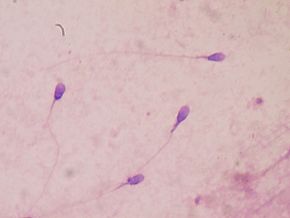
Pesticides stick around in the environment and in humans. Thus, it shouldn't be a surprise that a recent study found the pesticide glyphosate in men's sperm.
Glyphosate (also known as Roundup) is the most commonly used herbicide (weed-killer) in the world. It is used on both genetically modified crops (Roundup Ready crops), as well as conventional crops. [It is not allowed to be used on organic crops.] This means we ingest glyphosate when we eat nonorganic foods, when we breathe air that is contaminated with glyphosate (from applying the product or from nearby applications), or we get it on our skin.
In the study, 128 men with fertility problems had their blood and seminal fluid analyzed. Glyphosate was detected in the blood of 72 of the men, and in these men glyphosate was also detected in the seminal fluid (semen). Surprisingly, glyphosate levels were 4 times higher in the seminal fluid than in the blood!
Smokers had blood and seminal plasma concentrations twice as high as non-smokers, and workers on farms had higher levels than non-farm jobs (e.g., transport, communication, finance). The person with the highest glyphosate concentration was a farmer. They also found that in this study there was no difference in the sperm concentration, movement, or shape/abnormal forms between men with or without glyphosate in the blood.
However, oxidative stress was shown to be higher in men with glyphosate in the blood and seminal fluid. Oxidative stress is known to have harmful effects on sperm (e.g., injures mitochondria, sperm dysfunction). Thus, the researchers concluded that glyphosate has a negative effect on male reproductive health.
To lower your glyphosate levels: Your levels can be reduced within days by switching to an organic diet. Also, don't use Roundup for weed control. If possible, use non-toxic alternatives in your yard (e.g, vinegar, boiling water, burn weeds with a Dragon torch, hand weed, or accept weeds as "wildflowers").
Excerpts from Beyond Pesticides: Presence Of Weed Killer Glyphosate In Human Sperm Elevates Debate On Pesticide Threats To Human Survival
A study published in the most recent edition of the journal Ecotoxicology and Environmental Safety documents for the first time the presence of the herbicide glyphosate in human sperm. The study looked at 128 French men with an average age of 36 years who tested positive for glyphosate in their blood. ...continue reading "Common Pesticide Found In Human Semen"

 There is much concern nowadays about all the many chemicals we are exposed to in our lives. These include pesticides, heavy metals (e.g. lead, mercury), and chemicals that act as endocrine disruptors (hormone disrupting chemicals), such as BPA and phthalates. These chemicals are all around us and are linked to all sorts of health effects, including
There is much concern nowadays about all the many chemicals we are exposed to in our lives. These include pesticides, heavy metals (e.g. lead, mercury), and chemicals that act as endocrine disruptors (hormone disrupting chemicals), such as BPA and phthalates. These chemicals are all around us and are linked to all sorts of health effects, including